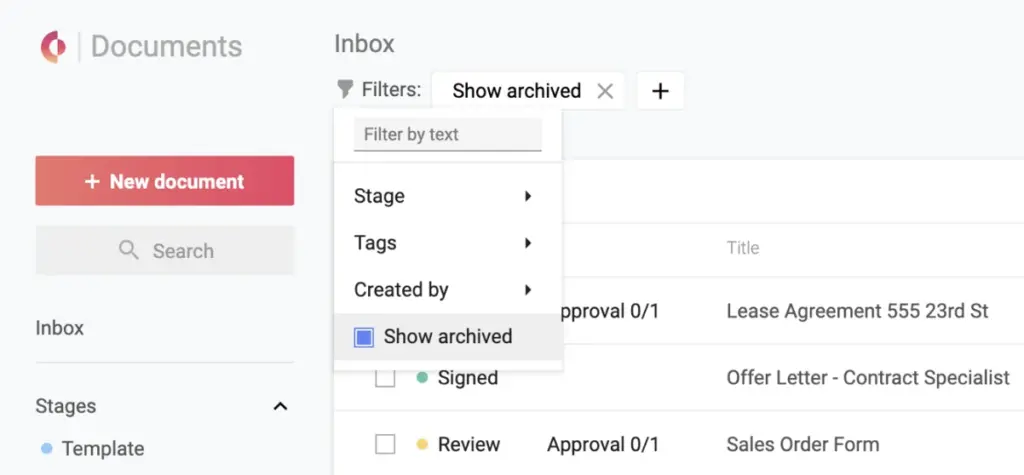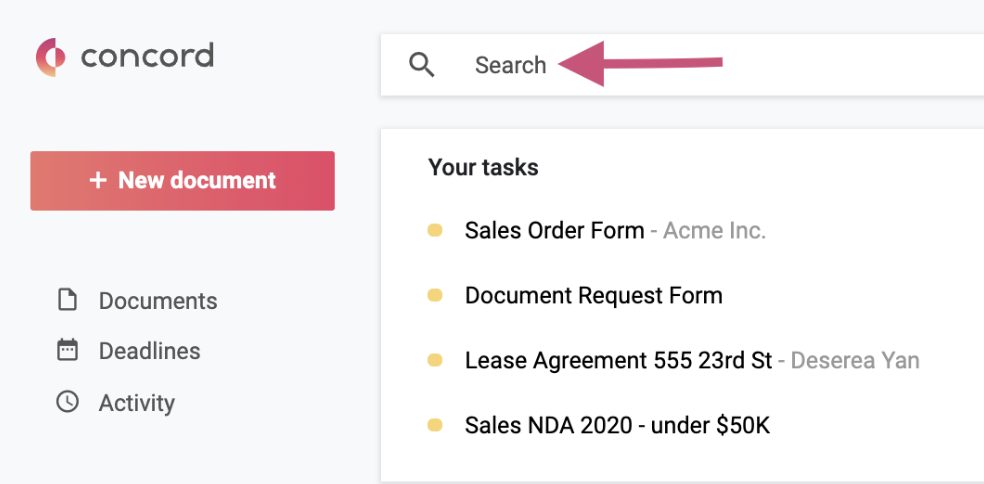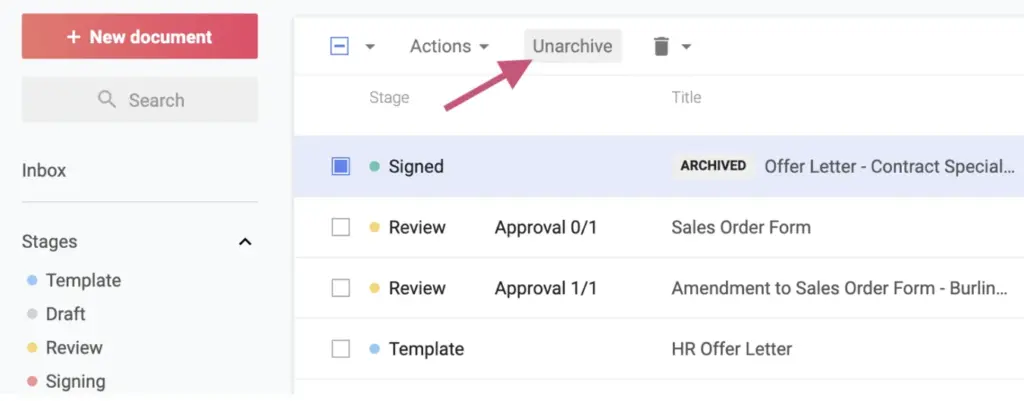Centralizing your company’s contracts in a single archive makes it much easier to find agreements. When you archive contracts efficiently, you’ll also gain a clear overview of upcoming renewal and cancellation deadlines, so you can avoid late fees.
Here, we’ll explain how to archive contracts step-by-step — and how to quickly retrieve contracts you’ve archived. But first, let’s get clear on what a contract archive is, and why it’s worth setting one up.
What is a contract archive?
A contract archive is a system where your company securely stores all finalized contracts. This archive acts as a centralized repository, allowing you to access important agreements quickly and efficiently. It helps you stay compliant with legal requirements and manage contract lifecycle efficiently by providing an easy way to track expiration and renewal dates.
Why set up a contract archive?
Setting up a contract archive gives you better control over your contractual documents. By keeping all contracts in one place, you can quickly review terms, assess obligations, and ensure all agreements are up to date. This improves your ability to respond to queries and audits, and supports better decision-making by keeping critical contractual information at your fingertips.
How to archive contracts efficiently
The most efficient way to archive contracts is to use a contract repository like Concord. This will keep your documents secure with bank-level encryption, while still making their full text easily searchable for authorized users.
How to archive a document
- Click Store & Track to upload Word and PDF documents to Concord.
- In your Document Inbox, check the checkboxes beside the documents you’d like to archive.
- Click the Archive icon that appears in the menu at the top of the page.
How to view archived documents
- In your Document Inbox, click Filters in the top left-hand corner to open the Filters menu.
- Check the checkbox beside the Show archived filter.

How to search archived documents
Concord includes AI-powered full-text search functionality, including optical character recognition (OCR) to search the text of PDFs. Just click the search bar and start typing to retrieve archived documents by text they contain.

How to unarchive a document
- On your Document Inbox, click Filters in the top left-hand corner to open the Filters menu.
- Check the checkbox beside the Show archived filter.
- Check the checkboxes beside the archived documents to be unarchived.
- Click the Unarchive action from the toolbar above the documents.
- Selected documents will be unarchived, and will be immediately visible in the Document Inbox again.

Why archive documents in a contract repository?
A contract repository provides many benefits in comparison to general-purpose cloud storage tools.
Here are the key reasons to archive documents in a contract repository.
Improved accessibility
Archiving documents in a contract repository means you can access critical agreements quickly. This system eliminates the time-consuming search through physical files or disorganized digital folders. With a centralized digital repository, you can retrieve documents on-demand, enhancing your productivity and response times to stakeholder inquiries.
Enhanced security
A contract repository offers enhanced security measures that protect sensitive information from unauthorized access. By storing documents digitally, you can implement robust security protocols such as encryption, access controls, and regular backups. This protection is crucial for complying with data protection regulations and safeguarding your business from data breaches.
Better compliance management
Having a dedicated repository helps you manage contract compliance more effectively. You can ensure all contractual documents are stored according to legal requirements and industry standards. Regular audits are simpler to conduct when all agreements are organized and readily available. This also helps you stay prepared for legal reviews or compliance checks.
Streamlined contract management
A contract repository simplifies contract management throughout your agreements’ lifecycles. For example, you can track important milestones like renewal dates, expiration, and performance metrics from a single interface. This visibility allows you to proactively manage your contracts, optimize negotiations, and prevent lapses in agreements that could affect your operational workflows.
Data extraction for analysis
A contract repository not only stores your agreements but also allows for sophisticated data extraction. This feature enables you to analyze contract data systematically, extracting key insights about trends, performance, and compliance. By leveraging data analytics, you can identify patterns and opportunities for improvement, measure contract effectiveness, and make informed decisions that align with your strategic goals.
Automated deadline alerts
With a contract repository, you can set up automated contract deadline reminders for key milestones such as renewal or termination dates. These alerts help make sure you never miss important milestones that could impact your business relationships or financial commitments. Automated notifications help you manage your contracts proactively, allowing for timely actions and decisions that maintain continuity and compliance in your business operations.
Cost efficiency
Storing contracts in a repository reduces physical storage needs and administrative overhead. You save on costs related to physical filing systems, such as space rental and materials, and reduce the manpower needed for manual document handling. Additionally, digital storage solutions can scale with your business growth, preventing the need for costly expansions of physical storage.
For all these reasons, a contract repository is well worth setting up, if only for archival purposes. Once you’ve got all your contracts in one place, it’s much easier to keep them secure and accessible — and to extract and leverage the data in them to accelerate revenue growth.





